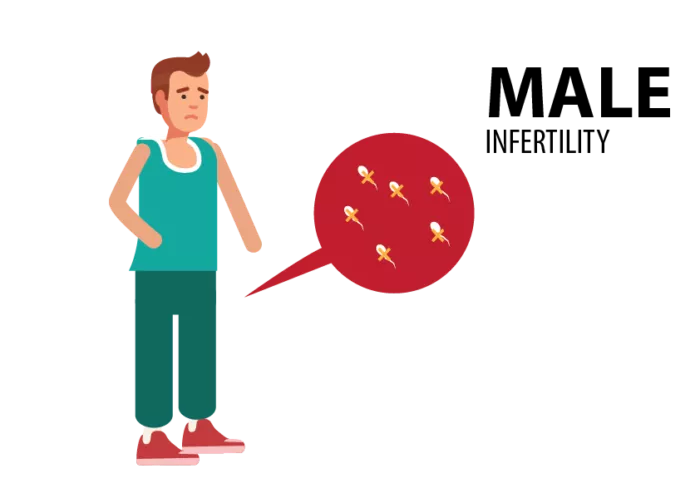Necrospermia is a condition characterized by the presence of a high percentage of dead sperm in the semen. Unlike other sperm-related conditions such as oligospermia (low sperm count) or asthenospermia (poor sperm motility), necrospermia specifically refers to sperm that are non-viable. This distinction is crucial as it directly impacts fertility and reproductive outcomes.
Identifying Symptoms
The primary symptom of necrospermia is the presence of dead sperm in the semen. This may be identified through semen analysis, which reveals a high percentage of non-motile or immotile sperm. Additionally, individuals with necrospermia may experience infertility or difficulties conceiving, which can prompt further investigation into sperm health.
Causes
Necrospermia can arise from various underlying factors, including hormonal deficiencies, genetic abnormalities, infections, lifestyle choices, and medical treatments. Hormonal imbalances, such as low testosterone levels, can disrupt sperm production and viability. Genetic disorders affecting sperm function or structure may also contribute to necrospermia. Infections of the reproductive tract, such as sexually transmitted infections or epididymitis, can impair sperm health. Lifestyle factors such as smoking, excessive alcohol consumption, obesity, and exposure to environmental toxins may also play a role. Additionally, medical treatments like chemotherapy or radiation therapy can damage sperm cells, leading to necrospermia.
Diagnosis
Diagnosing necrospermia typically involves a comprehensive evaluation of sperm health through semen analysis. This process assesses various parameters, including sperm count, motility, morphology, and viability. A high percentage of dead sperm in the semen sample indicates necrospermia. Additional tests may be conducted to identify underlying causes, such as hormonal assays, genetic testing, or imaging studies to evaluate the reproductive organs.
Treatment Options
Treatment for necrospermia aims to address underlying causes and improve sperm viability to enhance fertility outcomes. Depending on the specific factors contributing to the condition, treatment options may vary. Hormonal therapies may be prescribed to correct imbalances and stimulate sperm production. Antibiotics are used to treat infections affecting sperm health. Lifestyle modifications, including adopting a healthy diet, regular exercise, and avoiding harmful habits like smoking and excessive alcohol consumption, can improve overall reproductive health. In cases where underlying causes cannot be addressed or treated, assisted reproductive technologies (ART) such as in vitro fertilization (IVF) or intracytoplasmic sperm injection (ICSI) may be recommended to achieve pregnancy.
Impact on Fertility
Necrospermia significantly impacts fertility as it reduces the chances of natural conception. Dead sperm cells are incapable of fertilizing an egg, thereby impairing reproductive success. Individuals with necrospermia may experience difficulties conceiving and may require medical intervention to achieve pregnancy. However, the extent of fertility impairment varies depending on the severity of necrospermia and any underlying factors contributing to the condition.
Assisted Reproductive Technology (ART)
ART offers hope for individuals with necrospermia by bypassing the challenges posed by non-viable sperm. Techniques such as IVF and ICSI enable fertilization to occur outside the body, bypassing natural barriers to conception. In IVF, eggs are retrieved from the ovaries and fertilized with sperm in a laboratory setting before being transferred to the uterus. ICSI involves injecting a single sperm directly into an egg to facilitate fertilization. These procedures can overcome fertility obstacles associated with necrospermia and improve the chances of successful pregnancy. Success rates for ART vary depending on various factors, including the woman’s age, the quality of eggs and embryos, and any additional fertility issues.
Lifestyle Modifications
In addition to medical treatments, lifestyle modifications can play a significant role in managing necrospermia and improving fertility outcomes. Adopting a healthy lifestyle can positively impact sperm health and overall reproductive function. This includes maintaining a balanced diet rich in essential nutrients, staying physically active, managing stress levels, and avoiding exposure to environmental toxins. Quitting smoking and reducing alcohol intake can also have beneficial effects on sperm quality and fertility. Couples undergoing fertility treatment are often advised to make lifestyle changes to optimize their chances of success.
Expert Opinions and Advice
Seeking expert opinions and advice is essential for individuals affected by necrospermia. Fertility specialists, urologists, and reproductive endocrinologists can provide personalized guidance based on a thorough evaluation of the individual’s medical history, symptoms, and diagnostic tests. These experts can offer insights into the underlying causes of necrospermia and recommend appropriate treatment options tailored to the individual’s needs. Additionally, counseling and support services may be available to help individuals cope with the emotional and psychological aspects of infertility.
Personal Stories and Experiences
Sharing personal experiences and success stories can offer hope and encouragement to those affected by necrospermia. Hearing about others’ journeys towards parenthood can provide reassurance and a sense of community for individuals navigating similar challenges. Online forums, support groups, and fertility communities offer platforms for individuals to connect, share their stories, and offer support to one another. By sharing experiences and insights, individuals can find strength, resilience, and practical advice to navigate the complexities of infertility and pursue their dreams of building a family.
Conclusion
In conclusion, necrospermia is a condition characterized by the presence of dead sperm in the semen, which significantly impacts fertility and reproductive outcomes. Understanding the symptoms, causes, diagnosis, and treatment options for necrospermia is crucial for individuals affected by this condition. By seeking expert opinions, adopting lifestyle modifications, and exploring assisted reproductive technologies, individuals can overcome the challenges posed by necrospermia and improve their chances of achieving pregnancy. Additionally, sharing personal stories and experiences can provide support, encouragement, and a sense of community for those navigating the journey of infertility. With comprehensive care, personalized treatment, and a supportive network, individuals affected by necrospermia can embark on the path towards parenthood with hope and optimism.

























